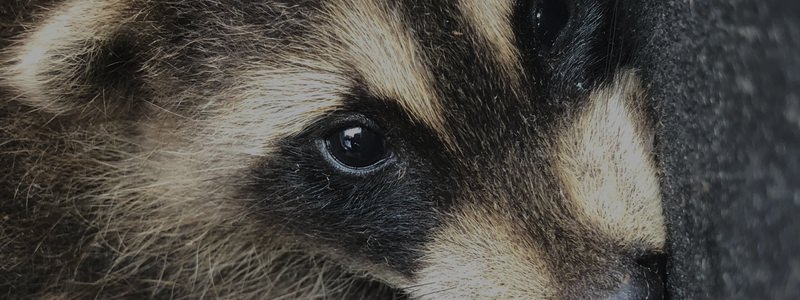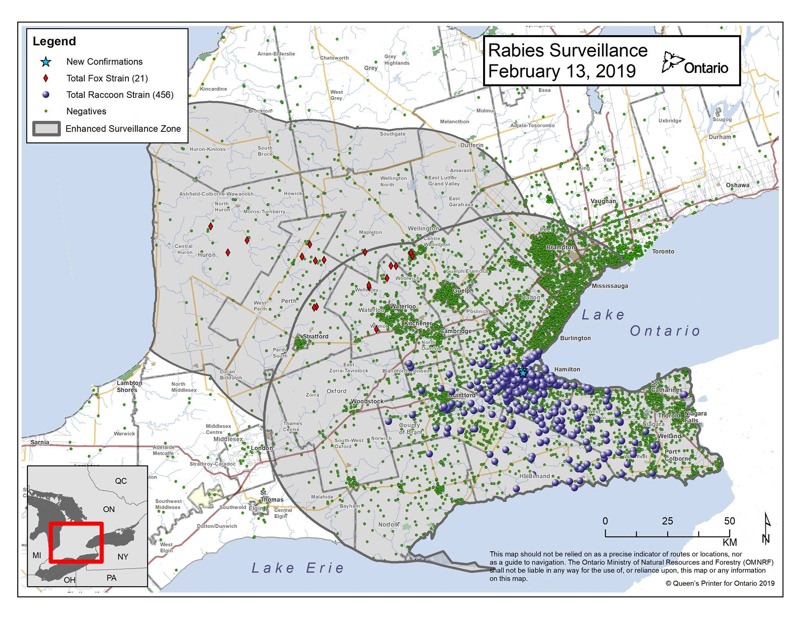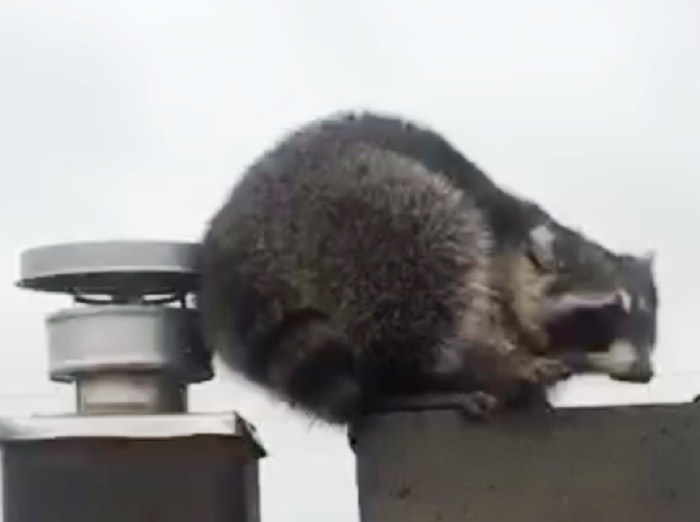
The Key Differences Between Rabies And Distemper Symptoms In Raccoons
Posted by Jared Houliston Friday, March 1st, 2019 | 108,808 Reads
Each year we get hundreds of calls from home owners who believe they’ve encountered a raccoon with rabies. Although Ontario has seen an increase in rabies over the past decade, the large portion of the reported cases turn out to be raccoons suffering from canine distemper.
Rabies and canine distemper are not the same. Both are generally fatal viral diseases but distemper attacks various bodily systems like the gastrointestinal and respiratory systems, while rabies affects the brain and nervous systems. They both affect the spinal cord and have shown symptoms of spinal cord lesions, but their complete list of symptoms are substantially different.
Below is a table of the primary differences in the symptoms between rabies and canine distemper:
| Canine Distemper (Middle English distemperen) | Rabies (Rabies lyssavirus) |
|---|---|
| high fever | fever |
| eye inflammation | headache |
| eye/nose discharge | brain inflammation |
| laboured breathing | meninges inflammation |
| coughing | paralysis |
| vomiting | anxiety |
| diarrhea | insomnia |
| loss of appetite | confusion |
| seizures | agitation |
| nose hardening | paranoia |
| footpads hardening | hallucinations |
| abnormal behaviour | delirium |
| extreme thirst | coma |
| lethargy | dehydration |
| appear blind or confused | excessive salivation |
The visual signs of distemper versus rabies in raccoons is that a raccoon afflicted with rabies may actually act more aggressive, while a raccoon afflicted with distemper may appear aggressive but actually be more disoriented and less afraid of humans.
Number of cases of rabies and distemper in Ontario
Over the past few years there’s been a steady rise in the number of cases of rabies and canine distemper among the raccoon populations in Ontario. In 2016 alone, we reported that there were 171 confirmed rabid raccoons in Ontario (that number has grown to 288 cases), and in 2017, there were 149 cases of rabies with 86 of them being attributed to raccoons.
On the other hand, statistics for cases of distemper are much higher within or without the raccoon populations. The SPCA responds to approximately 50 to 100 cases of distemper in raccoons per month per district. Cases of distemper in raccoons generally fluctuate throughout the year, but animal control services, the SPCA and the local humane societies all report a spike in the number of cases occurring during the mid-winter and early spring.
Below is an updated geographical depiction of number of raccoon strains of rabies in Ontario up to February 2019.

DID YOU KNOW? Dogs are largely responsible for introducing canine distemper into wildlife communities; it poses serious threats to many species of wildlife, had almost rendered the black-footed ferret extinct and it contributed to the extinction of the thylacine (Tasmanian tiger).
Which animals can contract distemper?
According to the Canadian Wildlife Health Cooperative, canine distemper:
…is caused by infection with the Canine morbillivirus. In North America this virus causes disease in domestic and wild dog species, coyotes, foxes, wolves, ferrets, skunks, raccoons, species of large wild cats, and pinnipeds. Domestic cats can also contract the virus, however, infection appears to be mostly asymptomatic. (source)
Humans can also contract distemper through exposure to the virus but have a higher chance of surviving, especially if they’re treated quickly and/or they’ve had a previous vaccination against the measles virus.
Causes and cures of distemper in raccoons
Like rabies, canine distemper (Canine morbillivirus) has no actual cure and only treatments of the disease are available for pets. Although there are many cases where the disease has been apparently cured in some dogs, even with ongoing treatment it has a 50% mortality rate in those affected.
 Raccoons found to be afflicted with distemper cannot be treated or vaccinated. When a raccoon with distemper is found, the only recourse is to have it euthanized. Although euthanization seems cruel and unfortunate there are virtually no other options available.
Raccoons found to be afflicted with distemper cannot be treated or vaccinated. When a raccoon with distemper is found, the only recourse is to have it euthanized. Although euthanization seems cruel and unfortunate there are virtually no other options available.
If the raccoon is not euthanized it will continue to suffer in extreme pain and anguish, and it can also spread the disease to other forms of wildlife while jeopardizing their habitats.
Canine distemper transmission in raccoons
Rabies is spread through exposure to the saliva of an infected animal, and distemper is generally passed through inhalation of the virus but also can spread through contact with bodily fluids or droppings of the animal that’s infected.
Historically distemper was usually spread from dogs to other forms of wildlife that have come into contact with it, or vice versa but the presence of the virus has become so rampant that it’s increasingly being spread from raccoon to raccoon within their natural habitat.
What you can do to stop the spread of distemper
If you own a dog, you can help stop the spread of canine distemper by ensuring that it gets vaccinated. This will ensure that it doesn’t get the virus and will hinder it from spreading it to other animals.
If you encounter a raccoon that is acting strange or odd and showing symptoms of distemper, you can reporting it to your local humane society or SPCA. By doing so, the raccoon will be examined, and if necessary it will be humanely euthanized. If you encounter a raccoon in your attic, and it also appears to have distemper symptoms, you will need to call your local raccoon removal company to have it removed, and then call the SPCA to pick it up, and investigate it’s condition further.
Although at the first view, it doesn’t appear that the spread of canine distemper is becoming a crisis, the statistics and the research does show that it poses a minor threat to existing wildlife communities and it can easily contribute to the extinction of many species much more than the rabies virus does.
16 Responses to “The Key Differences Between Rabies And Distemper Symptoms In Raccoons”
Leave a Reply
Ontario Wildlife Removal Inc. provides wildlife removal and pest control in Southwestern Ontario, including Brantford, Kitchener-Waterloo, Cambridge, Guelph, London, Woodstock, Tillsonburg, Simcoe, Port Dover, Paris, St. George, Six Nations, Caledonia, Burlington, Waterdown, Oakville, Hamilton, Stoney Creek, Grimsby, & Niagara Region. Our methods are safe, humane and environmentally friendly. Call today to book your inspection.
Get a Pest Control Quote
Simply fill in your details below and we'll call you very shortly to discuss your issues.





Canine & feline parvo virus also fatal in raccoons, has been attributed to exposure of wildlife to the ‘pollution’ fall-out from domestic pet expansion into formerly isolated wildlife habitat. The world is changing, not for the better, with one aspect being more suffering for wildlife.
Thank you for this article. It removes fear and stigma around animals.
Very good info…I’m a rehabber and we have an out break if raccoon parvo, what vaccines can be given if any to prevent this, it’s highly contagious…any info would be appreciated…thank you
My friend just found a raccoon near her apartment building and she called the humane society, they told her it was probably distemper. She stayed with the raccoon until They arrived, she even pet it.
Hi Kim! That was nice of your friend to stay with the raccoon until they came, but always be extremely careful around a raccoon with distemper as they’re unpredictable, and because they’re not in their right state of mind, they could harm humans if they try to touch them. If they have rabies and bite, the problem will get even worse.
my pet raccoon is acting like she is blind. she has did this before about 2 or three time but i have always been able to talk to her to get her to settle down. I have had her since before her eyes were open’ she is about 18 months old now. I cant kill her and I WANT LET NO ONE ELSE. WHAT SOULD I DO?
Hi Chelynn, the best thing to do is to bring your pet raccoon to a wildlife sanctuary if there is one near you, or call a vet to see if they will help.
In addition to the raccoon spreading the disease and suffering from the disease it is also looked upon as prey if it’s incapacitated in any way, which is another potential way it may suffer (and further pass the disease on).
This is very true, thank you for this additional piece of information Evelyn
Hi I’m a pre-vet student from Florida (but I like to help out in rescue and rehab when I can) and I helped rescue a raccoon today (he most likely had distemper and had to be euthanized). I was speaking with a rehabber that walked me through the process on the phone afterwards and she said she recently found an opossum with distemper. I know opossums are mostly resistant to those types of diseases (low body temp and all) so that was surprising. How common is it to find opossums with distemper? Because I hadn’t heard of it before that conversation.
Hi Mia. Actually we haven’t come across an opossum with distemper either, but that is very interesting. We can presume that if there’s one that gets distemper, there may be others and it may be quite common. Thank you for the update!
Just found a racoon in my yard he was limping laying down and emitting saliva from the mouth I called 311 they were out in an hour
The person caged her she growled and barked they said it was distemper and would have to put her down
I’m sorry to hear that. Yes when a raccoon gets distemper it’s a very sad site. I’ve seen it a number of times.
Hello,
I know your not supposed to treat raccoons as pets. But finding 3 babies on the side of the road and momma on the side dead. I had to help them along. I truly did my best at limiting exposer. And this is not my first batch either. 4th litter to date right now. The previous 3 have all since wandered off into the woods. 1 still makes A appearance here and there. But any way. This batch of 3. 1 already gone off on his own. The only male I’ll add. So left with the 2 females. 1 smaller then the other. Is now falling down the stairs to the porch. And clumsly eating her food. & Also stumbling while walking. But eating. No discharge that I could see. So I’m not quite ready to call it distemper. But……..
Hi M.D. well that’s a lovely story and kind of you to take care of them. We hope the best for them all!
Hi I have some raccoons living around my home. I live in the country there’s lots of wild animals around. I notice a small groups of young raccoons older babies their all happy and healthy looking but about a week ago I noticed one of them walking with a wobbly. There’s no other signs of sickness. I saw the wobbly raccoon later than night and its still wobbly. It seems to be pretty alert, no runny eyes or nose. Can this be distemper?I would think if this was distemper or rabies a week is a long time with no progression in the disease. I’m stumbled on what this can be and there’s no injuries that I can see. Any ideas of what this can be? Any info you can help me with is appreciated, Thank you